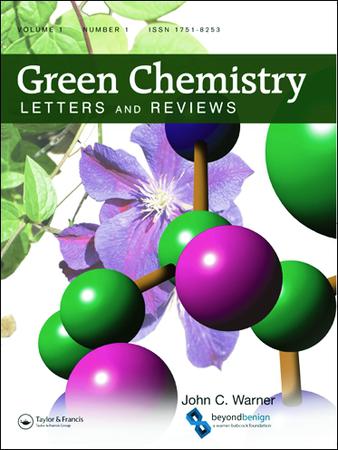The biosynthesis of zinc oxide nanoparticles using aqueous leaf extracts of Cnidoscolus aconitifolius and their biological activities
IF 5.1
3区 化学
Q1 CHEMISTRY, MULTIDISCIPLINARY
引用次数: 7
Abstract
ABSTRACT This study aims to biosynthesize zinc oxide nanoparticles using aqueous leaf extracts of Cnidoscolus aconitifolius and investigate their biological activities. UV–Vis Spectroscopy, FT-IR, SEM and TEM were used for characterization. The antioxidant properties were determined using H2O2, NO, ABTS, FRAP and DPPH scavenging assays. For anti-inflammatory activities, membrane stabilization, albumin denaturation and proteinase inhibitory activity were assayed. The antibacterial effect was tested using well diffusion method. Statistical analyses were done using ANOVA. Synthesized nanoparticles showed an intensity peak at 378 nm in UV–Vis Spectroscopy. FT-IR shows the presence of O-H stretching, C = C bending, O-H bending and C–N stretching functional groups of the stabilizing action of the plant extract on the surface of the nanoparticles. NPs were shown to be spherical by SEM analysis, and the sizes were 100 nm by TEM analysis. The antioxidant properties of ZnO NPs compared to ascorbic acid standard showed significant antioxidant potential in H2O2, NO, ABTS, FRAP and DPPH scavenging assays. ZnO NPs showed excellent anti-inflammatory activity with the synthesized ZnO NPs performing better in membrane stabilization. Clinical pathogens were inhibited by ZnO NPs when compared with Cefuroxime, a standard drug. These efficient biological activities could be utilized in several biological applications. GRAPHICAL ABSTRACT毛刺叶水提物合成氧化锌纳米颗粒及其生物活性研究
本文章由计算机程序翻译,如有差异,请以英文原文为准。
求助全文
约1分钟内获得全文
求助全文
来源期刊

Green Chemistry Letters and Reviews
CHEMISTRY, MULTIDISCIPLINARY-GREEN & SUSTAINABLE SCIENCE & TECHNOLOGY
CiteScore
9.10
自引率
3.00%
发文量
48
期刊介绍:
Green Chemistry Letters and Reviews is an Open Access, peer-reviewed journal focused on rapid publication of innovative new syntheses and procedures that reduce or eliminate the use and generation of hazardous materials. Reviews of state-of-the-art green chemistry technologies are also included within the journal''s scope.
Green Chemistry Letters and Reviews is divided into three overlapping topic areas: research, education, and industrial implementation. The journal publishes both letters, which concisely communicate the most time-sensitive results, and reviews, which aid researchers in understanding the state of science on important green chemistry topics. Submissions are encouraged which apply the 12 principles of green chemistry to:
-Green Chemistry Education-
Synthetic Reaction Pathways-
Research and Process Analytical Techniques-
Separation and Purification Technologies-
Renewable Feedstocks-
Degradable Products
 求助内容:
求助内容: 应助结果提醒方式:
应助结果提醒方式:


